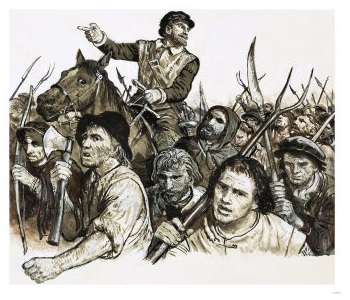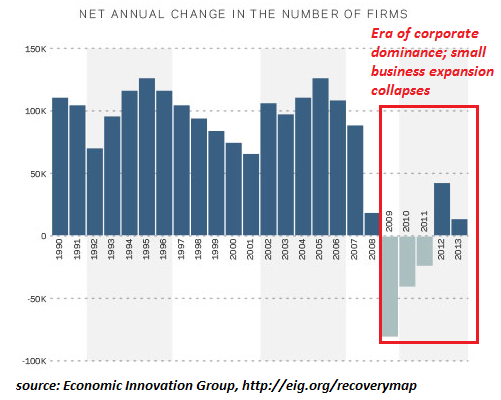Submitted by Charles Hugh-Smith via OfTwoMinds blog,
There is no avenue left for advocacy, grievances or redress in a system dominated by global corporations.

In the original version of feudalism, peasants armed with pitchforks knew where to go for redress or regime change: the feudal lord's castle on the hill. Though you won't find this in conventional narratives of the Middle Ages, peasant revolts were a common occurrence; serfs weren't always delighted to toil for their noble masters.
In the present era of corporate dominance, where can serfs go to demand redress and financial freedom from the neofeudal system? Nowhere. The global corporations that own the land and the productive assets have no castle that can be stormed; they exist in an abstract financial world of stock shares, buybacks, bonds, lobbyists and political influence.
When the agribusiness corporation fouls the local water supply with animal waste, where do the local peasantry go to demand restoration of their water quality? The corporation? What if the headquarters are thousands of miles away?
What impact will 100 serfs gathered outside the modern-day castle have on water quality in a distant land? Zero, because the corporation has rendered it illegal (via lobbying the local political flunkies desperate for "jobs" and campaign contributions) to even take photos of their vast animal-waste output or their inadequate disposal.
Where do oppressed serfs go to advocate for transparency in America's private Gulag prison system? If you go to the prison to protest, you'll be arrested and will soon be looking at the world from inside the privately operated gulag.
Once again–where is the castle on the hill? It's not there. The corporate operators of the private Gulag are far away, and security will disperse any troublesome serfs who travel hundreds of miles to air grievances.
Documenting abuses in the privately owned and operated Gulag is illegal. Corporate lobbying and campaign contributions have ensured that any attempt to document neofeudal exploitation by corporations is illegal.
And of course if documentation is impossible to obtain, then the exploitation doesn't exist. The mainstream media's default setting is to dismiss first-hand accounts as "he said, she said": the imprisoned serf says this, and the private prison spokesperson says that, and without any proof that can stand up in court, the grievance vanishes into thin air.
Try telling the African peasant who is unhappy with the Chinese owners of the land he tills to take his grievances to the owners of the land–a corporation in distant China that is owned by the Chinese army.
The reality is there is no avenue left for advocacy, grievances or redress in a system dominated by global corporations. The castle on the hill doesn't exist; it is diffused all over the planet, and well protected by state minions controlled by neofeudal corporate interests.
Do you really think it's mere coincidence that small business growth has imploded in the era of corporate dominance? As I explained yesterday in Governments Change, the Corporatocracy Endures, central banks dropping interest rates to near-zero for financiers and corporations sealed corporate dominance of finance and governance. There are few opportunities for small businesses when the financial and political structures serve neofeudal corporate interests.
Corporate power destroys democracy. That is the heart of neofeudalism.

The post Peasants, Pitchforks & How Corporate Power Destroyed Democracy appeared first on crude-oil.top.
